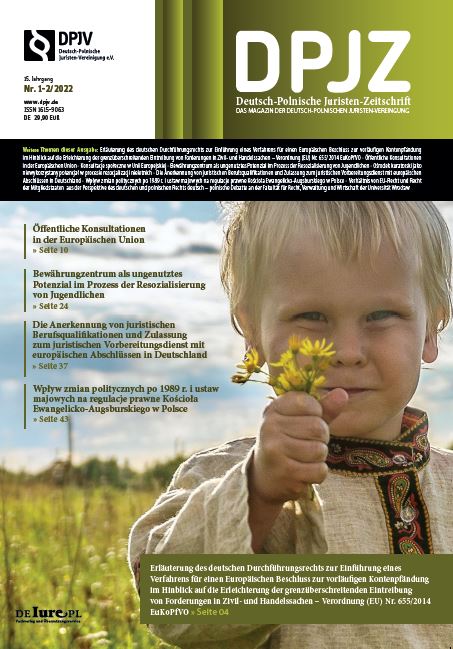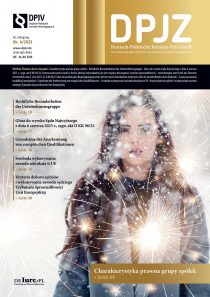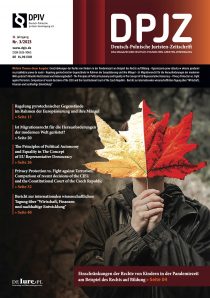- Prof. Dr. Antje G. I. Tölle
Erläuterung des deutschen Durchführungsrechts zur Einführung eines Verfahrens für einen Europäischen Beschluss zur vorläufigen Kontenpfändung im Hinblick auf die Erleichterung der grenzüberschreitenden Eintreibung von Forderungen in Zivil- und Handelssachen – Verordnung (EU) Nr. 655/2014 EuKoPfVO
Zusammenfassung: Die Europäische Kontenpfändungsverordnung (EU) Nr. 655/2014 gilt seit 2017 in allen Mitgliedsstaaten der Europäischen Union bis auf Dänemark. Der Beitrag stellt das nationale deutsche Recht vor, das in den §§ 946 ff. Zivilprozessordnung (ZPO) die Öffnungsklauseln der Verordnung ausfüllt und ergänzende Regelungen trifft. Damit werden die wichtigsten Zuständigkeiten, Verfahrensvorschriften und der Streitstand um die Anwendbarkeit auf Schiedsverfahren vorgestellt.
Schlüsselwörter: Europäische Kontenpfändungsverordnung, das nationale deutsche Recht, §§ 946 ff. Zivilprozessordnung, Öffnungsklauseln der Verordnung.
Summary: Since 2017 the European Account Preservation Order Regulation (EU) No. 655/2014 has been in effect in all Member States of the European Union except for Denmark. The article discusses the German national law which constitutes the opening clauses of the Code of Civil Procedure in §§ 946 ff. and sets out additional procedural rules. Thus, the article demonstrates the substantive jurisdiction of the courts, procedural rules, and the state of the discussion whether the regulation is applicable for arbitral procedures.
Keywords: European Account Preservation Order Regulation. German national law, §§ 946 Code of Civil Procedure,
Über die Autorin: Professorin an der Hochschule für Wirtschaft und Recht, Berlin, E-Mail
- Paweł Kuczma
ÖFFENTLICHE KONSULTATIONEN IN DER EUROPÄISCHEN UNION
Zusammenfassung: Die öffentliche Konsultation ist einer der Mechanismen der sozialen Teilhabe auf der Ebene der Europäischen Union. Öffentliche Konsultationen sind Tätigkeiten, die im Rahmen eines förmlichen Verfahrens von Behörden initiiert werden, um eine unverbindliche öffentliche Meinung zu den geplanten rechtlichen Lösungen einzuholen und die Absichten politischer Entscheidungen zu bewerten. Gegenstand des Artikels ist es die Darstellung der Entwicklung der Regelungen zu Sozialkonsultationen in der EU, der geltenden Regelungen zur Institutionalisierung des Prozesses der Einholung von Informationen über geplante rechtliche Lösungen von interessierten Parteien und der Standards, die dem Konsultationsverfahren zugrunde liegen.
Schlüsselwörter: öffentliche Konsultation, Europäische Kommission, Transparenzregister, Interessenverbände.
Summary: Social consultation is one of the mechanisms of public participation present at European Union level. Social consultations are activities initiated as part of a formalised procedure by the authorities in order to obtain a non-binding public opinion on the planned legal solutions and to assess the intentions of political decisions. The subject of the article is to present the development of regulations regarding social consultation in the EU, applicable regulations institutionalizing the process of obtaining information on planned legal solutions from interested parties and standards on which the consultation procedure is based.
Keywords: social consultations, European Commission, mandatory transparenty register, interest groups.
Über den Autor: Professor an der Universität Zielona Góra, Institut für Staatsrecht, Europäisches und Internationales Öffentliches Recht, Institut für Rechtswissenschaften, Rechtsanwalt, ORCiD: 0000-0003-1443-4742, E-Mail: p.kuczma @wpa.uz.zgora.pl.
- Paweł Kuczma
KONSULTACJE SPOŁECZNE W UNII EUROPEJSKIEJ
Streszczenie: Konsultacje społeczne są jednym z mechanizmów partycypacji społecznej obecnych na poziomie Unii Europejskiej. Konsultacje społeczne stanowią działania inicjowane w ramach sformalizowanej procedury przez organy władzy w celu uzyskania niewiążącej opinii społecznej na temat planowanych rozwiązań prawnych i oceny zamierzeń decyzji politycznych. Przedmiotem artykułu jest przedstawienie rozwoju regulacji dotyczących konsultacji społecznych w UE, obowiązujących regulacji instytucjonalizujących proces uzyskiwania informacji na temat planowanych rozwiązań prawnych od zainteresowanych oraz standardów, na których opiera się procedura konsultacyjna.
Słowa kluczowe: konsultacje społeczne, Komisja Europejska, rejestr służący przejrzystości, grupy interesu.
Summary: Social consultation is one of the mechanisms of public participation present at European Union level. Social consultations are activities initiated as part of a formalised procedure by the authorities in order to obtain a non-binding public opinion on the planned legal solutions and to assess the intentions of political decisions. The subject of the article is to present the development of regulations regarding social consultation in the EU, applicable regulations institutionalizing the process of obtaining information on planned legal solutions from interested parties and standards on which the consultation procedure is based.
Keywords: social consultations, European Commission, mandatory transparenty register, interest groups.
O autorze: Doktor habilitowany, profesor Uniwersytetu Zielonogórskiego, Katedra Prawa Konstytucyjnego, Europejskiego i Międzynarodowego Publicznego, Instytut Nauk Prawnych, radca prawny, ORCiD: 0000-0003-1443-4742, E-mail: p.kuczma@wpa.uz.zgora.pl.
- Dr. Paweł Kobes
Bewährungzentrum als ungenutztes Potenzial im Prozess der Resozialisierung von Jugendlichen
Zusammenfassung: Die Diskussion um die Schaffung einer gesetzlichen Neuregelung zum Umgang mit Jugendlichen mit Demoralisationserscheinungen schafft die Chance zur Wiederbelebung von Bewährungszentren, die in der Vergangenheit ein Beispiel für eine umfassende Form der Arbeit mit Jugendlichen und ihrer Familie sind. Dank der gestiegenen Bedeutung von Bewährungszentren besteht die Chance, die Lücke im Umgang mit Jugendlichen zu füllen, die darin besteht, dass in diesem Verfahren die Familie des Jugendlichen ignoriert und auf negatives Verhalten des Jugendlichen nicht früh genug reagiert wird, um tiefgreifende, negative Veränderungen zu vermeiden.
Es scheint, dass der beste Beweis für die Bedeutung von Bewährungszentren im System des Umgangs mit Jugendlichen die Tatsache ist, dass sich die Jugendlichen nach dem Lockdown aufgrund der Covid-19-Pandemie selbst sich bei ihnen gemeldet haben, was für Bewährungshelfer eine große Überraschung war.
Streszczenie: Reforma prawa nieletnich ponownie wywołała dyskusję na temat większego zaangażowania ośrodków kuratorskich w proces ich resocjalizacji. W dotychczasowym systemie postępowania z nieletnimi wykazującymi przejawy demoralizacji potencjał ośrodków kuratorskich nie jest w pełni wykorzystywany, choć od początku ich powstania w latach 70-tych cieszą się dobrą opinią i skutecznością podejmowanych w nich oddziaływań resocjalizacyjnych. Aby wykorzystać szerzej ich potencjał, ośrodki kuratorskie powinny m.in. być wykorzystywane jako środek tymczasowy, a także obejmować swoim zakresem oddziaływania również małoletnich zaniedbanych wychowawczo, a nie jedynie wykazujących przejawy demoralizacji.
About the author: Paweł Kobes – PhD in law, specializes in dealing with minors. Author of over 80 publications in the field of proceedings with minors, substantive criminal law, executive criminal law, criminology, E-mail: pawel.kobes@interia.pl.
Słowa kluczowe: Nieletni, ośrodki kuratorskie, resocjalizacja, środki wychowawcze
- dr Paweł Kobes
Ośrodek kuratorski jako niewykorzystany potencjał w procesie resocjalizacji nieletnich
Summary: The juvenile law reform again sparked a discussion on the greater involvement of probation centers in the process of their rehabilitation. In the current system of dealing with minors showing signs of demoralization, the potential of probation centers is not fully used, although from the beginning of their establishment in the 1970s, they enjoy a good reputation and the effectiveness of resocialization interventions undertaken in them. In order to use their potential more widely, probation centers should, inter alia, be used as a temporary measure, and also include with its scope of influence also neglected minors, not only those showing signs of demoralization.
Keywords: Juveniles, probation centers, rehabilitation, educational measures Information
About the author: Paweł Kobes – PhD in law, specializes in dealing with minors. Author of over 80 publications in the field of proceedings with minors, substantive criminal law, executive criminal law, criminology, E-mail: pawel.kobes@interia.pl.
Informacja o autorze: Paweł Kobes – dr nauk prawnych, specjalizuje się w problematyce postępowania z nieletnimi. Autor ponad 80 publikacji z zakresu postępowania z nieletnimi, prawa karnego materialnego, prawa karnego wykonawczego, kryminologii, E-mail: pawel.kobes@interia.pl.
- Magdalena A. Nestmann, LL.M.
Die Anerkennung von juristischen Berufsqualifikationen und Zulassung zum juristischen Vorbereitungsdienst mit europäischen Abschlüssen in Deutschland
Zusammenfassung: Juristische Berufe wurden seit jeher sehr geschätzt. Immer mehr Ausländer entscheiden sich, nach Deutschland zu kommen, um dort ihr Studium fortzusetzen oder einen Beruf als Rechtsanwalt auszuüben. In Deutschland gibt es jedoch keine Anerkennung der vollständigen juristischen Qualifikationen. Darüber hinaus gibt es mehrere Möglichkeiten, die für ausländische Juristen interessant sein können. In dem Artikel werden die Möglichkeiten der Anerkennung von Berufsqualifikationen durch die Feststellung eines gleichwertigen Berufsqualifikation und Eignungsprüfung für die Zulassung zur deutschen Rechtsanwaltschaft sowie die Ausübung des Berufes als ausländischer Jurist und die Registrierung als Rechtskundige im ausländischen Recht nach RDG dargestellt. Schließlich wurde Zulassung zum juristischen Vorbereitungsdienst für ausländischen Absolventen sowie Ablauf des deutschen Rechtsreferendariats dargelegt.
Schlüsselwörter: juristische Abschlüsse, deutsche Rechtsreferendariat, Rechtsdienstleistungen im ausländischen Recht
Summary: Legal professions have always been highly valued. More and more foreigners are deciding to come to Germany to continue their studies or to practice a profession as a lawyer. In Germany, however, full legal qualifications are not recognised. In addition, there are several possibilities that may be of interest to foreign lawyers. The article outlines the possibilities of recognition of professional qualifications by establishing an equivalent professional qualification and aptitude test for admission to the German Bar as well as practising the profession as a foreign lawyer and registering as a legal practitioner under foreign law in accordance with the RDG. Finally, admission to the legal preparatory service for foreign graduates and the course of the German legal traineeship were explained.
Keywords: legal qualifications, German legal traineeship, legal services in foreign law
Über die Autorin: mgr Magdalena A. Nestmann, LL.M. – Rechtskundige für polnisches Recht, Beeidigte Dolmetscherin und ermächtigte Übersetzerin für polnische Sprache, E-mail: info@nestmann.pl.
- Edyta Włodarczyk-Czech
Wpływ zmian politycznych po 1989 r. i ustaw majowych na regulacje prawne
Kościoła Ewangelicko-Augsburskiego w Polsce
Streszczenie: Artykuł skupia się na wpływie zmian politycznych po 1989 r. i ustaw majowych na regulacje prawne dotyczące Kościoła Ewangelicko-Augsburskiego w Polsce. Rok 1989 wyznacza niekwestionowany przełom w relacjach państwo-Kościół, głównie ze względu na uchwalenie 17 maja 1989 r. przez Sejm IX kadencji trzech niezwykle doniosłych dla stosunków wyznaniowych ustaw, które w doktrynie określa się mianem „ustaw wyznaniowych” lub „ustaw majowych”. Były to: ustawa o gwarancjach wolności sumienia i wyznania, ustawa o stosunku Państwa do Kościoła Katolickiego w Polskiej Rzeczypospolitej Ludowej oraz nieobowiązująca już ustawa o ubezpieczeniu społecznym duchownych. W następstwie tych wydarzeń, w latach 1991-1997 uchwalono kilkanaście tzw. ustaw indywidualnych o stosunku państwa do kościołów i związków wyznaniowych w Polsce. Jedną z takich ustaw była ustawa z dnia 13 maja 1994 r. o stosunku Państwa do Kościoła Ewangelicko-Augsburskiego w Rzeczypospolitej Polskiej. Obecnie obowiązująca ustawa dotycząca Kościoła Ewangelicko-Augsburskiego została uchwalona więc ćwierć wieku temu. Miało to miejsce na początku trwającej wówczas transformacji ustrojowej w Polsce. Uchwalając ją nie zapewniono Kościołowi autonomii i równorzędności w określeniu jego wzajemnych relacji z Państwem, gdyż zasady te wprowadziła dopiero obowiązująca Konstytucja RP z dnia 2 kwietnia 1997 r. W związku z tym stosowanie przez te lata ustawy z 1994 r. wykazało szereg luk prawnych, które wymagają nowelizacji. Artykuł ma na celu przybliżyć kwestię sytuacji politycznej Kościoła Ewangelicko-Augsburskiego w III RP oraz wskazać potrzebę nowelizacji ustawy indywidualnej tego Kościoła.
Słowa kluczowe: Kościół ewangelicko-augsburski, mniejszości wyznaniowe, polityka wyznaniowa, III Rzeczpospolita, stosunki państwo-Kościół, związek religijny.
Summary: The article focuses on the influence of the political changes after 1989 and the May laws on the legal regulations concerning the Evangelical Church of the Augsburg Confession in Poland. The year 1989 marks an unquestionable breakthrough in relations between the state and the Church, mainly due to the adoption on May 17, 1989, by the Sejm of the 9th term of office of three statutes which are extremely important for religious relations, and which are referred to in the doctrine as „religious laws“ or „May laws“. As a result of these events, in the years 1991-1997 several so-called individual laws on the attitude of the state to churches and religious associations in Poland. One of such acts was the Act of May 13, 1994, on the State’s Relationship to the Evangelical-Augsburg Church in the Republic of Poland. By adopting it, the Church was not guaranteed autonomy and equality in defining its mutual relations with the State, as these principles were introduced only by the binding Constitution of the Republic of Poland of April 2, 1997. Therefore, the application of the 1994 Act over the years has revealed several legal loopholes that require amendment. The article aims to present the issue of the political situation of the Evangelical-Augsburg Church in the Third Polish Republic and to indicate the need for an amendment to the individual law of this Church.
Keywords: Evangelical-Augsburg Church, religious minorities, denominational policy, the Third Republic of Poland, state-church relations, religious union.
Notka o autorze: Edyta Włodarczyk-Czech – asystent w Instytucie Historii Państwa i Prawa Uniwersytetu Wrocławskiego, Orcid ID: 0000-0003-2268-1268, Email: edyta.wlodarczyk@uwr.edu.pl.



